Editorial: Does Apple have the mettle to fight for Mac success in the Pro market?
Over the last two decades, Apple has largely pursued a strategy centered on "affordable luxury" personal devices, starting with iPod, blooming into iPhone and iPad, and now taking over in wearables. Mac Pro seems to be a wild departure.
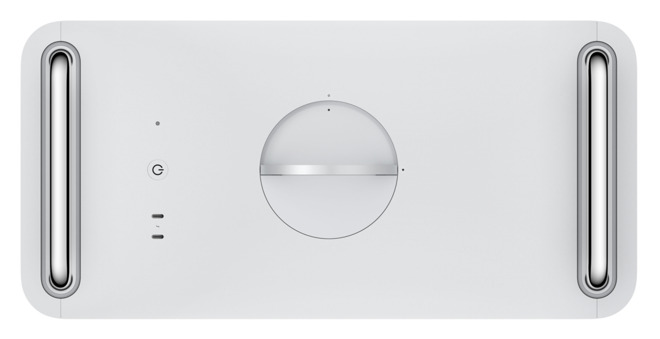
The new Mac Pro might seem far removed from what has made Apple successful
Apple's sales of premium but mass-market affordable iOS devices and consumer-focused Macs have reached a quarter billion units in annual sales, earning the company its current trillion-dollar valuation and its global presence as a technology leader, its role as the definer of market categories and design trends, and its status as a powerful force for establishing protocols and standards.
But Apple's new Mac Pro has a price few can justify for personal use--it's designed specifically for a small niche of specialized pros. As a product, it appears to run against everything that has made Apple commercially successful since the debut of the iPod.
Only a very small minority of Apple's installed base of active users have $6,000 to $15,000 laying around, allocated to spend on a fancy desktop computer. There are only relatively few entrepreneurial professionals and companies that buy higher-end workstations of any brand in that price range any more.
It's a rarified niche market, perhaps the smallest Apple has addressed since Steve Jobs pitched Xserve as the company's solution for workgroup servers and distributed computing in 2002. It's not controversial to say that Apple didn't make much of an impact on the rack-mounted server market across nearly a decade of trying with Xserve. A year after canceling it, Steve Jobs reported told a customer, "hardly anyone was buying them."
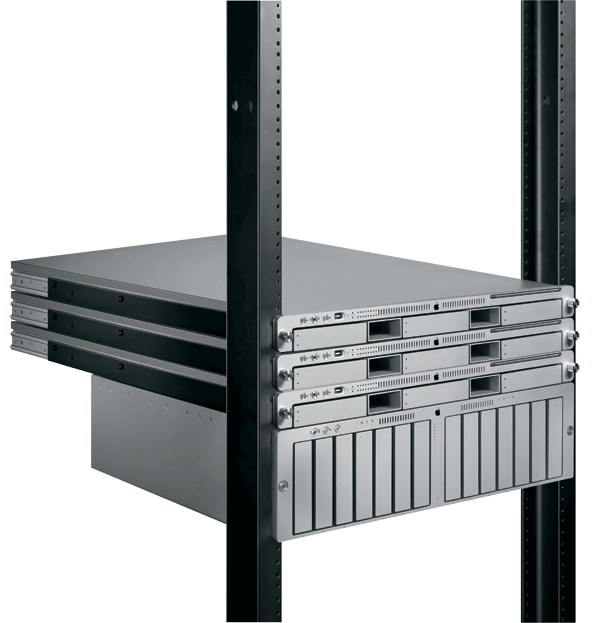
Three Xserves and an Xserve RAID mounted in a server rack
In 2009 as iOS sales exploded and Xserve languished without much impact on Apple's top or bottom line, it became clear that Apple's servers were little more than a distraction for the company. Xserve wasn't even strategically achieving anything. Instead, it had sent Apple on a wild goose chase of acquisitions and development to create uses for it, including Xgrid and Mac OS X Server's Podcast Producer.
After Apple officially discontinued Xserve -- along with the applications built for it -- at the beginning of 2010, the prospects for the company's desktop Mac Pro also began to look similarly weak, resulting in speculation that Apple might bow out of the entire "non-iMac" desktop Mac market entirely to focus on iOS devices.
In fact, as iPad sales peaked in 2015, Christopher Mims of the Wall Street Journal opined that Apple should "kill off the Mac" entirely and "focus on products which represent the future," following the logic that Macs were generating less than 10 percent of Apple's total revenues and that "Apple doesn't need this revenue."
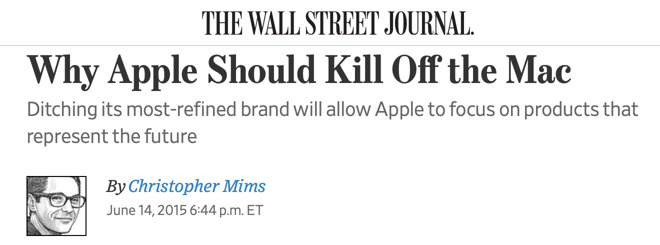
The Wall Street Journal has been peddling ignorant bullshit for so many years it's simply incredible
That was histrionic nuttery, as ten percent of Apple's revenues were still a ton of money. That year, sales of 20.6 million Macs generated $25.5 billion, exceeding the revenues of its iPad business, which shipped 54.9 million tablets for $23.2 billion.
Also, some cognitive dissonance from Mims -- Apple can't remove a headphone jack or USB-A ports without years of public freakout, but the entire Mac platform could just be tossed tomorrow and nobody would notice.
Mims' creative writing, while untethered to reality, did capture the popular but facile thinking that Apple was doing so well with iOS that maybe the Mac was just a relic of the past that would someday fritter away, perhaps being replaced with really fast iPads as soon as Apple could figure out how to connect it to a mouse, and get its Mac app frameworks to run on ARM processors.
Who, outside of the most demanding pros users, still needs a large powerful PC box connected to a display and tied to a desk? A competitive amount of power can now be delivered in the portable convenience of a notebook. And for most consumer tasks, the simple, ultralight iPad is even enough-- and perhaps even a better fit.
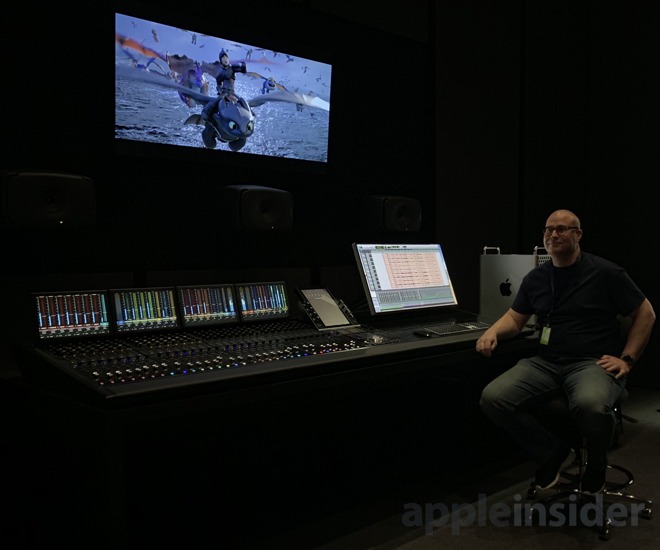
At WWDC19, Mac Pro was shown orchistrating hundreds of audio tracks in a theatrical sountrack
If Mims had written in 2015 that Apple should back out of the desktop Mac market and focus only on the iMac and notebooks that were popular sellers, he'd have sounded less like a doofus and more like a reporter, because Apple's other desktop sales were, apparently, turning into little more than an immaterial, busywork distraction.
By then, Apple had targeted that small, remaining market with its compact Mac mini and its higher-powered analog in the 2013 Mac Pro. Both attempted to package the most processing power into the smallest package, minimizing their size and bulk.
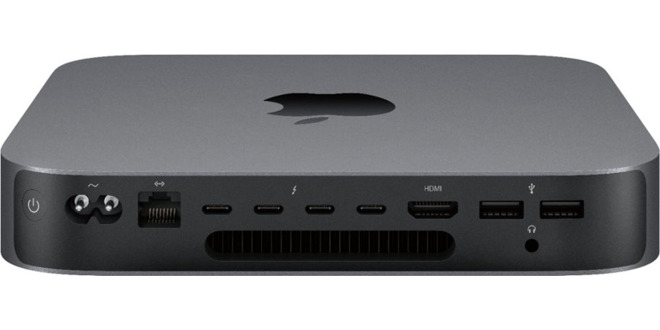
Mac mini is an affordable option for home buyers
However, the people who need more processing power than a MacBook Pro -- and more expandability and display options than an iMac Pro -- are largely working in specialized, professional fields such as video and music production, or code development and big data research. Much of the storage, graphics, and other specialized expansion they required were not ideally optimized to work with the Thunderbolt cable expansion strategy that Apple has been pursuing.
Instead, economies of scale in the pro market were favoring conventional PCIe expansion cards for GPUs, for DSPs, and other expensive, state of the art add-ons. The most valuable end of the pro market also has an appetite for the fastest processors, memory architectures, backplanes, and external connectivity available, which Apple hasn't been consistently delivering with its leisurely updated, desktop Mac releases devoid of any public road map.
So while it may have appeared that Apple was focused on its lower-priced, high volume sales of iOS devices and was failing to properly capitalize upon the needs of pro users by trying to reach them with the same "sealed-up, simple, and beautiful" approach that had worked in selling to consumers, it's actually more meaningful to note that Apple was selling premium priced, luxurious products to iOS buyers, but was trying to sell cost-effective, entry-level products to desktop Mac buyers -- in the hope that it could achieve greater sales at a lower price point. How un-Apple! That was also the same strategy that hadn't worked out well for Xserve.
Apple's customers with the most demanding needs and the least price sensitivity weren't looking to save money on a value-engineered desktop Mac.
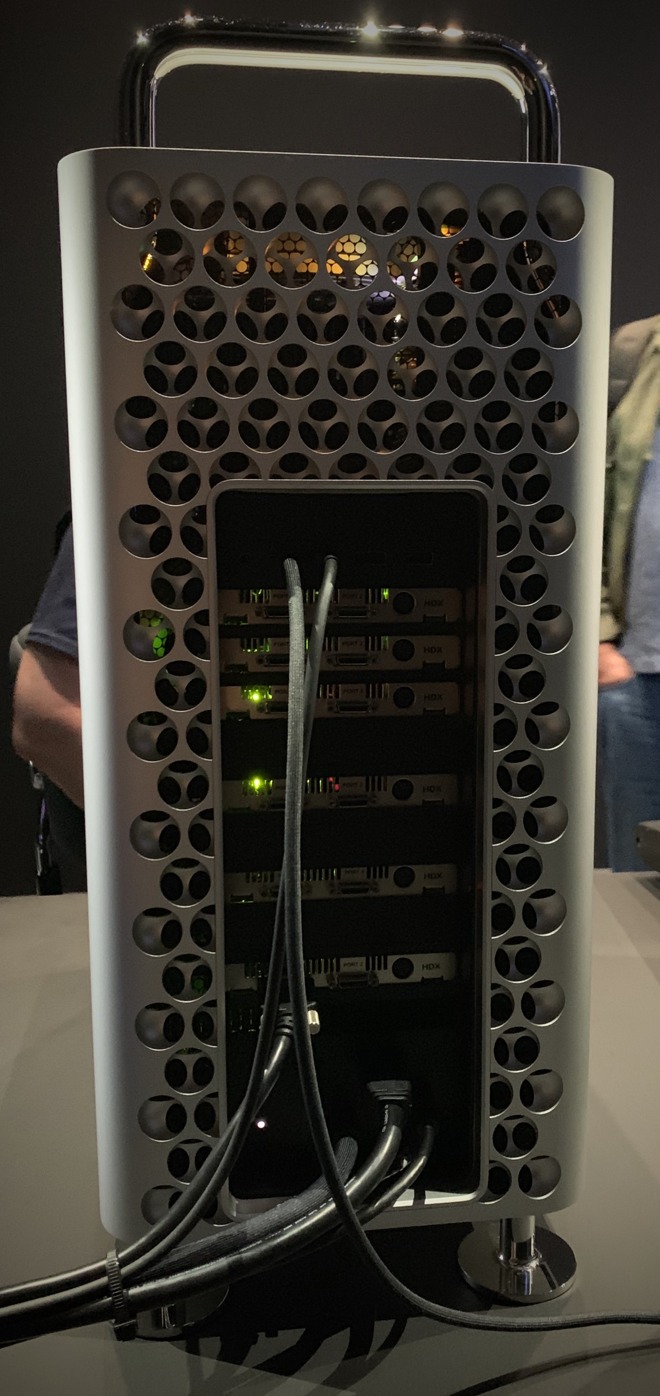
So while the new Mac Pro might sound like another Xserve, it has more in common with iPhone-- a high-end entry into what was once a minuscule market. In 2006, Nokia, HTC, Sony, Microsoft, and others were convinced that there couldn't possibly be any significant demand for a +$650 smartphone.
Entering new markets with a premium product and then expanding downward is perhaps Apple's core competency, but pundits haven't quite figured this out. Last year, Apple's critics scoffed at HomePod debuting with sales of about 3 million units, comparing it to the 40 million Echos that Amazon claimed to have shipped across the past few years.
But these were not two commodity WiFi mics being sold to the same set of customers, even if "research groups" with an agenda had come up with a marketing name for "smart speakers" that equated a $30 mic with a $350 sound system to allow them to make unfavorable comparisons about Apple's miserable "market share."
Instead, Apple and Amazon had products aiming to reach very different markets with very different strategies. Lots of analysts get hung up on "market share" of a generalized product category without looking at the difference in the value of a particular, premium market segment compared to the impressive proportion but unimpressive value of the majority of that market as a whole.
It's like comparing actually good apples with Red Delicious. One is a fruit people buy to eat or cook with, the other is a tasteless, easy-to-ship agricultural travesty that America sends to its schools and prisons. "Market share" of the two combined products wouldn't tell you anything about what people like, what they're willing to pay for, or which product will continue to be commercially successful to produce in the future.
Similarly, Apple's iPod sopped up all the profits in MP3 players by entering "the market" as an expensive device that was nicer than the other expensive products that were barely selling at all. But iPod didn't outsell the most basic of memory sticks or cassette players-- at least not until Apple had first won over the high end and began expanding downward. But it also didn't need to.
Apple's iPod faced no real competition from 32MB MP3 players or tape decks. Calculating "market share" of every device capable of playing back songs wouldn't have helped anyone understand where the music industry was headed. It would have only misinformed people, the same as IDC reporting that Apple Watch was "behind" Xiaomi's $15 bands in "wearable unit sales."
The iPhone similarly didn't set out to outsell feature phones. Steve Jobs said Apple planned to take just 1% of the mobile phone business in its first year. It ended up taking a huge chunk of the barely existent smartphone market immediately, but Jobs' point was that even one percentage point of the vast mobile market was a huge opportunity, if it could replace some "carrier friendly, good enough" sales with a desire for a premium product.
In PCs, Apple's Mac sales are barely enough to make it into the top five vendors, with quarterly sales that are about half of Dell's and only a third of Lenovo or HP. Yet Apple's 5 million or so Macs sold per quarter make vastly more money than the more than 30 million PCs shipped by HP and Lenovo put together. As with phones, that's because Apple is selling almost exclusively high-end Macs, rather than focusing on selling large volumes of cheap PCs. Unit sales numbers alone don't tell you that.
IDC has been dutifully calculating market share for PCs, phones, and tablets that have provided absolutely no insight into where things were headed. IDC itself predicted Microsoft would win in phones and tablets and Android in "media tablets," before being forced to effectively concede that its reports and conclusions were virtually worthless in hindsight. That same kind of data is going to tell us nothing about Mac Pro.
The question is: will Mac Pro be profitable enough in such small quantities to justify the work invested into designing, building and -- critically -- maintaining it as a product that gets regularly updated? The previous Mac Pros were not, at half the price. Their low price was part of the reason for that.
If Apple had pulled the plug on the Mac platform back in 2015, then the answer to "is Mac Pro on its own a sustainable business?" would be "absolutely not." If it were, we'd also likely have a bunch of other proprietary workstation vendors still around. Yet we do have some high-end Windows PC makers, sharing the costs of developing their premium systems with the rest of the Windows platform.
Apple's Mac Pro shares its costs in two directions. It runs the same macOS that has to be kept up to date for Apple's other successful Mac hardware. That platform also now inherits much of its progress from iOS, as detailed in our macOS Catalina review.
Effectively, iOS subsidizes macOS development, allowing it to progress far faster than it could on its own. That's true even if you are suffering through early Catalina issues like the rest of us.
In an imaginary scenario where iOS never existed, rather than dealing with the incremental update upheavals in Catalina, you'd be struggling through the kind of problems Apple shoveled out in the era of Panther, Tiger and Leopard: pretty but useless features like Dashboard, Comic Sans Notes, and the weird Mail 3.0.
Back then, rather than subsidizing faster Mac development, Xserve was bleeding it dry. Today, Mac Pro suggests it can not only benefit from many of the technologies that iOS is funding but can also make its contributions to the macOS platform.
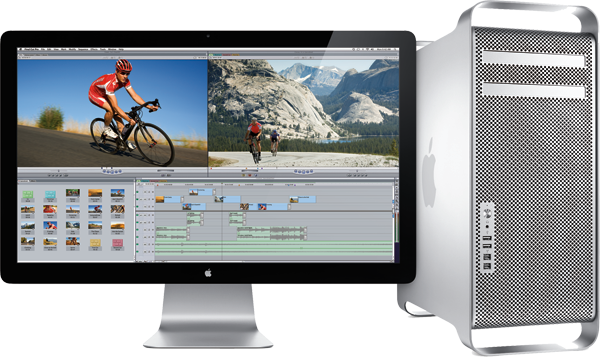
A lot has changed at Apple since the last PCIe Mac Pro
Not only has Apple racked up a decade of hyper-accelerated macOS development since then, but its profits from billions of iOS devices have equipped the company to operate on a new scale, in industries it wasn't taken seriously in the last time it had a PCIe-based Mac Pro.
Perhaps 2012 seems like it just happened, but it was an epoch ago in Apple-time. Back then, Apple Park was just a dream on paper. Now it's a sprawling campus featuring one of the world's most sophisticated design centers. Apple now builds its mobile CPUs and GPUs, and they are better than Intel's and Qualcomm's.
Apple's Mac Pro architecture also leverages lots of economies of scale with the high-end PC market: certainly, PCIe, Intel processors, and other standard components from SATA drive options to Thunderbolt 3 and its USB-C ports. From that perspective, it's not prohibitively expensive for Apple to deliver a new high-end Mac Pro, as many of the costs have already been paid for.
There are remaining expenses that are new and custom to this machine. Apple built bespoke aspects of a modern PC that no other PC has, including supercharged MPX system expansion and a somewhat conventional PC design with a very unconventional number of PCIe lanes. Apple appears to have custom-designed its motherboard chipset, rather than using off the shelf parts. And of course, the new Mac Pro gains unique benefits from Apple's T2 chip, which originated from Apple's iOS silicon work and has already been paid for by previous generations of Macs.
So it would be a mistake to view today's Mac Pro only through the lens of previous Apple Pro products, like the Xserve or earlier Mac Pros. Apple is a wildly different company than it was even just seven years ago. There is, however, another factor related to the new Mac Pro that serves as a "negative cost" for developing the new machine. In other words, the existence of the Mac Pro creates or induces something that benefits Apple elsewhere, that it wouldn't be able to get without the Mac Pro existing as a product. The next segment will take a look.

The new Mac Pro might seem far removed from what has made Apple successful
Apple's sales of premium but mass-market affordable iOS devices and consumer-focused Macs have reached a quarter billion units in annual sales, earning the company its current trillion-dollar valuation and its global presence as a technology leader, its role as the definer of market categories and design trends, and its status as a powerful force for establishing protocols and standards.
But Apple's new Mac Pro has a price few can justify for personal use--it's designed specifically for a small niche of specialized pros. As a product, it appears to run against everything that has made Apple commercially successful since the debut of the iPod.
An entirely different game
The new Mac Pro seems to represent a nostalgic return to the company's late 1980s Golden Age of Macintosh, which perhaps peaked with the Mac IIfx in 1990, starting at $9,000. Just as then, the new machine is being aimed at professionals who will expect to earn money on their new hardware, rather than mainstream consumers who want something that "just works" while being stylish and well-built.Only a very small minority of Apple's installed base of active users have $6,000 to $15,000 laying around, allocated to spend on a fancy desktop computer. There are only relatively few entrepreneurial professionals and companies that buy higher-end workstations of any brand in that price range any more.
It's a rarified niche market, perhaps the smallest Apple has addressed since Steve Jobs pitched Xserve as the company's solution for workgroup servers and distributed computing in 2002. It's not controversial to say that Apple didn't make much of an impact on the rack-mounted server market across nearly a decade of trying with Xserve. A year after canceling it, Steve Jobs reported told a customer, "hardly anyone was buying them."

Three Xserves and an Xserve RAID mounted in a server rack
In 2009 as iOS sales exploded and Xserve languished without much impact on Apple's top or bottom line, it became clear that Apple's servers were little more than a distraction for the company. Xserve wasn't even strategically achieving anything. Instead, it had sent Apple on a wild goose chase of acquisitions and development to create uses for it, including Xgrid and Mac OS X Server's Podcast Producer.
After Apple officially discontinued Xserve -- along with the applications built for it -- at the beginning of 2010, the prospects for the company's desktop Mac Pro also began to look similarly weak, resulting in speculation that Apple might bow out of the entire "non-iMac" desktop Mac market entirely to focus on iOS devices.
In fact, as iPad sales peaked in 2015, Christopher Mims of the Wall Street Journal opined that Apple should "kill off the Mac" entirely and "focus on products which represent the future," following the logic that Macs were generating less than 10 percent of Apple's total revenues and that "Apple doesn't need this revenue."

The Wall Street Journal has been peddling ignorant bullshit for so many years it's simply incredible
That was histrionic nuttery, as ten percent of Apple's revenues were still a ton of money. That year, sales of 20.6 million Macs generated $25.5 billion, exceeding the revenues of its iPad business, which shipped 54.9 million tablets for $23.2 billion.
Also, some cognitive dissonance from Mims -- Apple can't remove a headphone jack or USB-A ports without years of public freakout, but the entire Mac platform could just be tossed tomorrow and nobody would notice.
Mims' creative writing, while untethered to reality, did capture the popular but facile thinking that Apple was doing so well with iOS that maybe the Mac was just a relic of the past that would someday fritter away, perhaps being replaced with really fast iPads as soon as Apple could figure out how to connect it to a mouse, and get its Mac app frameworks to run on ARM processors.
Small Macs for a shrinking niche
In reality, Macs sales have grown significantly over the last 20 years -- from around 4 million in 2000 to over 18 million last year. However, the majority of that increase has come from notebooks, along with some growth in iMacs. Sales of conventional desktop Macs, which once made up the vast majority of Apple's sales in the 1980s and 1990s, have indeed remained a very small niche.Who, outside of the most demanding pros users, still needs a large powerful PC box connected to a display and tied to a desk? A competitive amount of power can now be delivered in the portable convenience of a notebook. And for most consumer tasks, the simple, ultralight iPad is even enough-- and perhaps even a better fit.

At WWDC19, Mac Pro was shown orchistrating hundreds of audio tracks in a theatrical sountrack
If Mims had written in 2015 that Apple should back out of the desktop Mac market and focus only on the iMac and notebooks that were popular sellers, he'd have sounded less like a doofus and more like a reporter, because Apple's other desktop sales were, apparently, turning into little more than an immaterial, busywork distraction.
By then, Apple had targeted that small, remaining market with its compact Mac mini and its higher-powered analog in the 2013 Mac Pro. Both attempted to package the most processing power into the smallest package, minimizing their size and bulk.

Mac mini is an affordable option for home buyers
However, the people who need more processing power than a MacBook Pro -- and more expandability and display options than an iMac Pro -- are largely working in specialized, professional fields such as video and music production, or code development and big data research. Much of the storage, graphics, and other specialized expansion they required were not ideally optimized to work with the Thunderbolt cable expansion strategy that Apple has been pursuing.
Instead, economies of scale in the pro market were favoring conventional PCIe expansion cards for GPUs, for DSPs, and other expensive, state of the art add-ons. The most valuable end of the pro market also has an appetite for the fastest processors, memory architectures, backplanes, and external connectivity available, which Apple hasn't been consistently delivering with its leisurely updated, desktop Mac releases devoid of any public road map.
So while it may have appeared that Apple was focused on its lower-priced, high volume sales of iOS devices and was failing to properly capitalize upon the needs of pro users by trying to reach them with the same "sealed-up, simple, and beautiful" approach that had worked in selling to consumers, it's actually more meaningful to note that Apple was selling premium priced, luxurious products to iOS buyers, but was trying to sell cost-effective, entry-level products to desktop Mac buyers -- in the hope that it could achieve greater sales at a lower price point. How un-Apple! That was also the same strategy that hadn't worked out well for Xserve.
Apple's customers with the most demanding needs and the least price sensitivity weren't looking to save money on a value-engineered desktop Mac.
Market size matters, but what you do with it matters more
Apple's big and fast new Mac Pro now aims to reach the relatively small pro market with an entry from a high premium tier with a narrowly specialized product, rather than approaching the bottom-end of the market with an affordable, but more limited product designed to be broadly accessible to everyone from home media server users to theatrical film editors. The music editing system on display above, for example, had six Avid HDX cards installed (below), which would add around $22,000 to the base price of the Mac Pro.
So while the new Mac Pro might sound like another Xserve, it has more in common with iPhone-- a high-end entry into what was once a minuscule market. In 2006, Nokia, HTC, Sony, Microsoft, and others were convinced that there couldn't possibly be any significant demand for a +$650 smartphone.
Entering new markets with a premium product and then expanding downward is perhaps Apple's core competency, but pundits haven't quite figured this out. Last year, Apple's critics scoffed at HomePod debuting with sales of about 3 million units, comparing it to the 40 million Echos that Amazon claimed to have shipped across the past few years.
But these were not two commodity WiFi mics being sold to the same set of customers, even if "research groups" with an agenda had come up with a marketing name for "smart speakers" that equated a $30 mic with a $350 sound system to allow them to make unfavorable comparisons about Apple's miserable "market share."
Instead, Apple and Amazon had products aiming to reach very different markets with very different strategies. Lots of analysts get hung up on "market share" of a generalized product category without looking at the difference in the value of a particular, premium market segment compared to the impressive proportion but unimpressive value of the majority of that market as a whole.
It's like comparing actually good apples with Red Delicious. One is a fruit people buy to eat or cook with, the other is a tasteless, easy-to-ship agricultural travesty that America sends to its schools and prisons. "Market share" of the two combined products wouldn't tell you anything about what people like, what they're willing to pay for, or which product will continue to be commercially successful to produce in the future.
Similarly, Apple's iPod sopped up all the profits in MP3 players by entering "the market" as an expensive device that was nicer than the other expensive products that were barely selling at all. But iPod didn't outsell the most basic of memory sticks or cassette players-- at least not until Apple had first won over the high end and began expanding downward. But it also didn't need to.
Apple's iPod faced no real competition from 32MB MP3 players or tape decks. Calculating "market share" of every device capable of playing back songs wouldn't have helped anyone understand where the music industry was headed. It would have only misinformed people, the same as IDC reporting that Apple Watch was "behind" Xiaomi's $15 bands in "wearable unit sales."
The iPhone similarly didn't set out to outsell feature phones. Steve Jobs said Apple planned to take just 1% of the mobile phone business in its first year. It ended up taking a huge chunk of the barely existent smartphone market immediately, but Jobs' point was that even one percentage point of the vast mobile market was a huge opportunity, if it could replace some "carrier friendly, good enough" sales with a desire for a premium product.
In PCs, Apple's Mac sales are barely enough to make it into the top five vendors, with quarterly sales that are about half of Dell's and only a third of Lenovo or HP. Yet Apple's 5 million or so Macs sold per quarter make vastly more money than the more than 30 million PCs shipped by HP and Lenovo put together. As with phones, that's because Apple is selling almost exclusively high-end Macs, rather than focusing on selling large volumes of cheap PCs. Unit sales numbers alone don't tell you that.
IDC has been dutifully calculating market share for PCs, phones, and tablets that have provided absolutely no insight into where things were headed. IDC itself predicted Microsoft would win in phones and tablets and Android in "media tablets," before being forced to effectively concede that its reports and conclusions were virtually worthless in hindsight. That same kind of data is going to tell us nothing about Mac Pro.
Will demand sustain continued development?
Mac Pro sales are likely only going to be measured in hundreds of thousands, even if it turns out to be very popular and successful. It's not going to shift Apple's "PC market share" -- but it doesn't have to. If Apple can sell even 150,000 of them at around $7,000 each, that's a billion-dollar business, the same as its first year of three million HomePods at $350 each, or nearly 40 million of Amazon Echo Dots selling for $30.The question is: will Mac Pro be profitable enough in such small quantities to justify the work invested into designing, building and -- critically -- maintaining it as a product that gets regularly updated? The previous Mac Pros were not, at half the price. Their low price was part of the reason for that.
If Apple had pulled the plug on the Mac platform back in 2015, then the answer to "is Mac Pro on its own a sustainable business?" would be "absolutely not." If it were, we'd also likely have a bunch of other proprietary workstation vendors still around. Yet we do have some high-end Windows PC makers, sharing the costs of developing their premium systems with the rest of the Windows platform.
Apple's Mac Pro shares its costs in two directions. It runs the same macOS that has to be kept up to date for Apple's other successful Mac hardware. That platform also now inherits much of its progress from iOS, as detailed in our macOS Catalina review.
Effectively, iOS subsidizes macOS development, allowing it to progress far faster than it could on its own. That's true even if you are suffering through early Catalina issues like the rest of us.
In an imaginary scenario where iOS never existed, rather than dealing with the incremental update upheavals in Catalina, you'd be struggling through the kind of problems Apple shoveled out in the era of Panther, Tiger and Leopard: pretty but useless features like Dashboard, Comic Sans Notes, and the weird Mail 3.0.
Back then, rather than subsidizing faster Mac development, Xserve was bleeding it dry. Today, Mac Pro suggests it can not only benefit from many of the technologies that iOS is funding but can also make its contributions to the macOS platform.
Apple has changed a lot since the last PCIe Mac
Compare today's Mac Pro with the 2012 model, which today looks folksy and sort of archaically-cute (below). Since that last PCIe Mac shipped, Apple's iOS devices have largely funded the development of everything from Retina Displays to an entirely new Deference UI, Notifications, iMessage and Continuity features, apps like Maps and FaceTime, and platform-level technologies like Dark Mode, Core ML, and Swift UI.
A lot has changed at Apple since the last PCIe Mac Pro
Not only has Apple racked up a decade of hyper-accelerated macOS development since then, but its profits from billions of iOS devices have equipped the company to operate on a new scale, in industries it wasn't taken seriously in the last time it had a PCIe-based Mac Pro.
Perhaps 2012 seems like it just happened, but it was an epoch ago in Apple-time. Back then, Apple Park was just a dream on paper. Now it's a sprawling campus featuring one of the world's most sophisticated design centers. Apple now builds its mobile CPUs and GPUs, and they are better than Intel's and Qualcomm's.
Apple's Mac Pro architecture also leverages lots of economies of scale with the high-end PC market: certainly, PCIe, Intel processors, and other standard components from SATA drive options to Thunderbolt 3 and its USB-C ports. From that perspective, it's not prohibitively expensive for Apple to deliver a new high-end Mac Pro, as many of the costs have already been paid for.
There are remaining expenses that are new and custom to this machine. Apple built bespoke aspects of a modern PC that no other PC has, including supercharged MPX system expansion and a somewhat conventional PC design with a very unconventional number of PCIe lanes. Apple appears to have custom-designed its motherboard chipset, rather than using off the shelf parts. And of course, the new Mac Pro gains unique benefits from Apple's T2 chip, which originated from Apple's iOS silicon work and has already been paid for by previous generations of Macs.
So it would be a mistake to view today's Mac Pro only through the lens of previous Apple Pro products, like the Xserve or earlier Mac Pros. Apple is a wildly different company than it was even just seven years ago. There is, however, another factor related to the new Mac Pro that serves as a "negative cost" for developing the new machine. In other words, the existence of the Mac Pro creates or induces something that benefits Apple elsewhere, that it wouldn't be able to get without the Mac Pro existing as a product. The next segment will take a look.

Comments
Based on past history of just abandoning anything that takes a modicum of effort
it would be unwise for those who are not of the Apple Sheep cloth to put much faith
in Apple being consistent with any product at this level. You only need look at
1. The demise of the Xserve server and RAID
2. Apple acquiring and doing nothing with PowerSchool.
3. The neglect of iBook Author despite the small but fanatical fan base
4. Aperture’s slow decaying death
5. OS X Server turning into a toy
Apple’s spent their money on AI companies and other ancillary technologies but they haven’t spent much effort
into growing their Pro apps beyond routine small features and maintenance updates.
I’d trust Apple if I had a few workstations to purchase but I’d be wary with committing to anything more than that.
I'd like to see some support for this assertion. I'm skeptical that it's true. The "flawgic" of the assertion is revealed by looking at the small firms out there selling high-end hardware that are evidently profitable. Take a look at system76.com, a niche builder of high-end Linux systems. Their Thelio lineup https://system76.com/desktops range from Core or Ryzen desktops up to dual Xeon workstations. These Linux-only custom desktops represent a much smaller niche than Apple's pro desktops.
If the Mac Pro became unprofitable after 2012 it wasn't because of low volumes, it was because Apple made a terrible design choice with the 2013 model. It would have been far cheaper to keep the old design and update the components and they likely would have sold in higher volume. Instead, they wasted money on a flawed design that was less popular.
I'm sick reading you banging on about how smart and profitable Apple is. As you say, the Mac division on its own would be a Fortune 500 company. When did they last truly innovate? Have you seen some of the recent PC hardware? It might not all be perfect but they try. Apple design for me has been getting lazy for years. The whole trash can Mac Pro was possibly the worst bit of design in Apple's history. All the users wanted was a powerful box they could stick under their desks, maybe fit some cards into for specialist pro tasks, and not really think about at all. Instead, they got something that's beautiful to look (well at least until it has wires spewing out all over the place) but not much more useful than a Mac Mini for professional tasks. It's then left for years without a single update. Absolutely crazy for a Fortune 500 sized outfit.
The new Pro looks amazing but it's targeted at a very small niche audience. I and a lot of people like me need something bigger than a Mini and smaller than a Pro. A Mac Middle if you will...
surely a bit over reacting there, don’t you think?
the abandoned products you are mentioning were hardly that great and not much more than distractions.
XServe came at the end of an era that was wiped out by blades, dedicated nas builders and epic scale cloud farms that go so far now to design and build their own modules.
Aperture and ibook creator were both clearly place holder solutions to promote the use of their platforms, not the applications themselves. same goes with reality composer in 2019. final cut is a platform thankfully.
Apple lacks commitment to projects that are long term bets. Their pro history is littered with hardware/software that wasn't really developed as far or as well as it could have been.
And it isn't even limited to the pro segment either. A lot of propietary hardware became a headache for users at some point.
Recent 'gaps' in product lines only serve to increase the sensation of having to be wary at all times (Mac Pro, Mac Mini, iPad Mini etc).
IMO, Apple should be bending over backwards to convince prospective buyers that the new Pro hardware will here for the long term. A five year warranty would be a great starting place.
That's not going to happen. While it sounds good in theory, you would instantly have thousands of specialized Mac Mini racks around the world become obsolete. When the racks are no longer good people will start to look and see what else is out there. The Mini form factor is a victim of its own success. Same reason they kept the iPod Touch in its same form factor; to keep compatibility with all the custom sleds out there that dock to it.
https://appleinsider.com/articles/10/11/08/alleged_steve_jobs_e_mail_says_hardly_anyone_was_buying_apples_xserves
The desktop is my preference, with a nod to my beloved MacPro laptop as well. I'm always going to root for Apple to succeed (bought it at $15/share!) just as it seems some are always going to hope Apple will fail. So, loved the positive/hopeful slant of this article, although I will never own one!
As we said in the early days when Apple was the upstart "personal computer," "THE APPLE II FOREVER!"
Bye R@y
Did anyone bother to ask Cook why no one was buying their servers? Or was it too easy to just accept his answer and move on so everyone there got invited to the next Apple event?
The only bit they threw at people was a mediocre "migration" paper that did not even cover some of the most important services.
Current trash-can users probably feel the same way too. – If they still exist.
Timmy should be ashamed of himself, and they way the company have handled a large number of customers who used to be all-Apple shops.